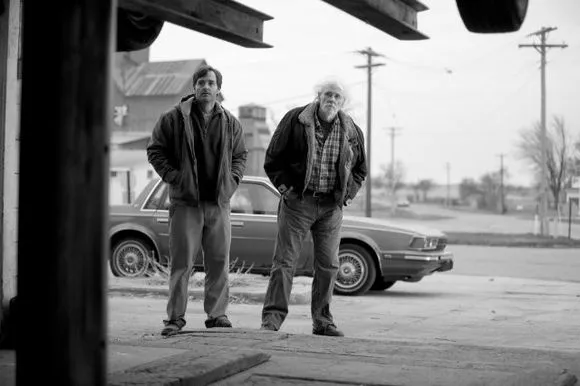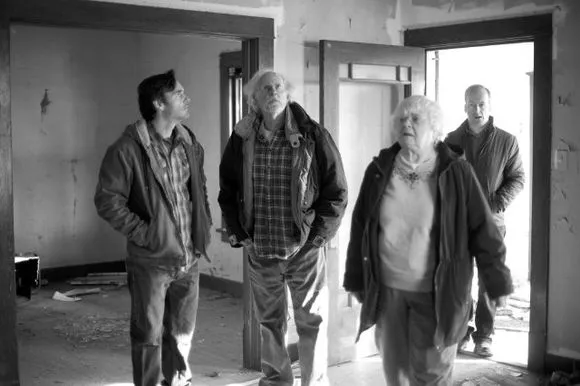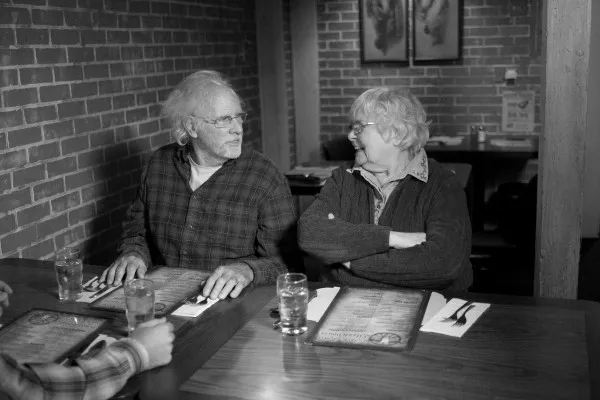Nebraska: A Heartwarming Tragicomedy of Family and Dreams
A touching tragicomedy about a grumpy old man and his good-natured son, journeying through the American heartland – a testament to Hollywood’s ability to stir the soul and heart, not just the eyes and ears.
Woody Grant, a cantankerous old man barely able to walk, is struck by a whim in his twilight years. He receives a sweepstakes certificate in one of the junk mail flyers, promising him a million-dollar prize. His family tries to convince Woody that it’s a scam, a marketing ploy, but the old man stubbornly attempts to travel to Lincoln, where the lottery company’s office is located, to claim his winnings. Resigned to his father’s persistence, his son Dave volunteers to accompany him on the road trip. Their journey through the American Midwest leads them to a town where Woody spent his youth…

Director Alexander Payne belongs to that cohort of Hollywood masters whose name in the credits speaks volumes about the film even before it begins. A Payne production guarantees a non-trivial story about ordinary people, the unnoticed cogs in the societal machine who suddenly experience an incredible upheaval in their otherwise unremarkable lives. Such was “About Schmidt,” such were “The Descendants,” and such is “Sideways.” “Nebraska,” if not a continuation, is certainly an event occurring, as they say in comic book adaptations, in the same universe as the director’s previous films. A universe of unkempt, angular, sometimes absurd America.

The Heart of America
The American Midwest itself is a key character in the film, a generalized image of all the tiny towns, practically devoid of young people, living on memories of the mid-20th century, still recalling century-old grievances. Instead of the sought-after Lincoln, a roadside incident leads Woody and Dave to Hawthorne, the Grant family’s hometown, where Woodworth Grant once owned a car repair shop, and David Grant learned to walk and talk. The encounter with the past draws the characters into a tragicomic vortex.

The studio was initially skeptical about Payne filming in black and white but changed its tune after hearing the first feedback from focus groups.
A Cold War of Generations and Ideals
While “Nebraska” doesn’t overly emphasize it, Payne subtly initiates a “cold war” on several fronts from almost the first frames: fathers and sons, city and country, past and present, youth and old age – clashes occur constantly, but these aren’t galactic confrontations leading to collapse. Rather, they are light touches on the strings of a musical instrument. These touches create small, barely noticeable vibrations, revealing the characters, making them burn brighter and more diversely (even though the film is in black and white). This road movie, which doesn’t immediately captivate, ultimately endears the viewer so much to the Grant family that it becomes incredibly difficult to hold back tears in the final ten minutes. At the same time, the film is by no means heavy-handedly manipulative; the old man Woodworth, you see, desperately doesn’t want to be indebted to anyone, even his own son. And it is precisely this touching, elderly independence that transforms the harmful miser into a person you sincerely empathize with, secretly hoping that he will indeed get lucky with the million.

Alexander Payne met Bruce Dern back in 1996 when he was working on the film “Citizen Ruth,” where Bruce’s daughter Laura Dern starred. Since then, the director had been looking for a role for Bruce Dern, only finding it 17 years later.
Stellar Performances
Of course, a good drama is impossible without a cast that clearly understands what to do on screen. And here, Alexander Payne once again surprised even his most devoted fans. The entire leading trio of performers surpassed themselves. Bruce Dern is a legendary figure in cinema, but his work in “Nebraska” is simply incomparable, even within the actor’s vast filmography. Woody Dern is both unbearably harmful and touchingly charming. June Squibb, who had already worked with Payne in “About Schmidt,” demonstrates an incredible transformation in the new film – the role of the family matriarch, simultaneously grumpy and sarcastic, is a triumph, her character always in the foreground in every scene. And Will Forte deserves completely separate high praise. It was hard to expect such a deep immersion in the material and such organic work with the character from someone we know exclusively for comedic roles, often tastelessly stupid and vulgar ones. But in “Nebraska,” it’s as if there’s a different person on the screen. Yes, he’s still not a macho man, doesn’t always have an answer, and can’t be proud of every action, but he is the engine of this road adventure.
Because the film covers a very wide range of emotions, feelings, and problems, it can be recommended to everyone. It has love, family affection and responsibility, friendship and betrayal, naivety and the harsh truth of life. The characters overcome a lot on this journey to Nebraska and, as cliché as it sounds, they fairly receive their winnings.